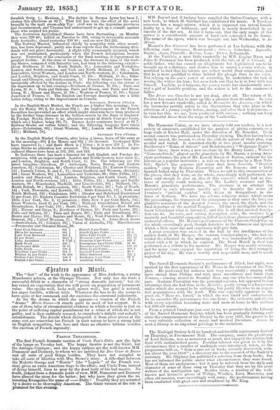Funsen Tunkrarosta.
The first :French dramatic version of Uncle Tom's Cabin saw the light of the lamps on Tuesday last. The happy theatre is not the Gaith, but the Ambigu-Comique ; and the happy authors are the well-blown MM. Dumanoir audDennery, to whom we are indebted for Don Cesar de Bazan and all sorts of good things besides. They have not scrupled to take all sorts of 'liberties with Mrs. Stowe's story. A rifle-duel between the Mulatto George and "Harris" (the " Legree" of the French ver- sion) gives an extra American tinge to the affair; and Uncle Tom, instead of dying himself, lives to pray by the dead body of his bad master. No doubt, judged from a dramatic point of view, MM. Dumanoir and Dennery have altered,the story for the better ; but why have they given the in- teresting Evangelinethe name of -1)elly ? Possibly they are actuated by a desire to be thoroughly American. The With version of the tale is _promised for this eveitiAg- MM. Bayard and d'Arrigny have supplied the Opem-Comique with a new book, to which M. Gartmel has contributed the music. A Tyrolese sorceress has a magic mirror, which it is supposed can reveal female frailty by a loss of brilliancy, and which is nearly demolished in an emeute of the fair sex. At last it turns out, that the only magic of the mirror is a considerable amount of hard cash concealed in its frame. The name of the opera, which was brought out last Wednesday, is Le Miroir.
Mozart's Don Giovanni has been performed at Les Italiens, with the following cast : Giovanni, Monternerli ; (Mario, Calzolari ; Leporello, Susini ; Anna, Cruvelli ; Zerlina, Vera ; Eleira, Beltramelli. At the Varietes, a neat little vaudeville by MM. Eugene Nyon and Jules de Premaray has been produced, with the title of M. le Vicomte. A noble father, who has caused an illegitimate but legitimized serf to be brought up at a distance, and desires him to marry a young widow, is mortified to find that his talents are rather useful than ornamental, and that he is more qualified to shine behind the plough than in the salon. Not relying on his son's power of courtship, he undertakes the task of wooing the widow for him ; but soon finds out that he is in love with her himself. Luckily, as it happens, the young rustic has clandestinely mar- ried a girl of humble position, and the widow is left to the enamoured father.
The Dame aux Camelias is not yet dead, after all. The return of M. Fechter has caused her to start up like a phoenix from its ashes. In vain has a new five-act vaudeville, called Le Baromare des Amoure,-in which the barometer prettily refers to the fluctuations that take place in the affections of a young couple before, during, and after their honeymoon,- in vain has this, we say, been produced with success ; nothing can keep the immortal Dame from the stage of the Vaudeville.


































 Previous page
Previous page